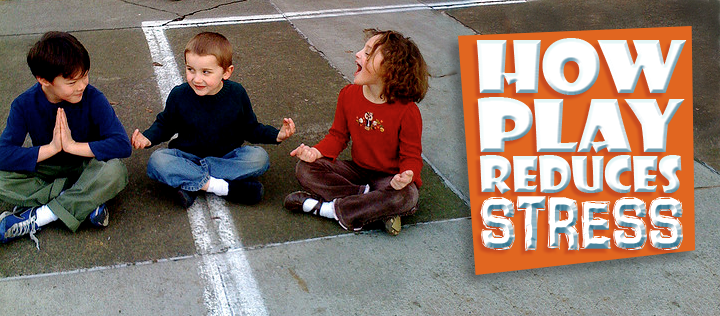How Play Reduces Stress and Creates Healthy Kids

Children are busier today in terms of schedules, demands, and expectations than they have ever been. That is because well-meaning parents are determined to provide ample physical and group activities that enhance their children’s development. It sounds like a good thing, until researchers started to point out the symptoms of stress and anxiety that children can develop as a result of being an “over-scheduled child.” Children develop distinct symptoms of anxiety and stress when they are not provided with adequate free play or creative play time on their own terms.
Until the 1950s, parents in North America did not actively manage their children’s play time or recreational activities. Children were allowed to create their own play experiences without excessive supervision or direction. Safety concerns are part of the restrictions placed on children today, where parents hesitate to allow unsupervised play or exploration. How often do you see neighborhood children exploring on their bicycles by themselves nowadays?
Educational experts are aware of the need for more unsupervised and relaxed play time, which does not imply sedentary activities. In fact, some researchers are noting that the symptoms of “burn-out” are more common among teens that were over-scheduled as young children. And, rather than keeping up the pace in their teens, many kids reduce their activity altogether, feeling tired and overwhelmed by the experience of a challenging schedule.
"By the time they reach high school, they are bored and burned out," says Alvin Rosenfeld, MD, former head of child psychiatry at Stanford University and author of The Over-Scheduled Child. "And it's because their parents have the well-meaning idea that the right way to parent is to overschedule them, with hopes of keeping them busy, active, and out of trouble." – Source: Web 2015 WebMD.com
“By age 13, statistics show, three of every four children who participated for several years in organized activities have permanently shelved their cleats, Scout uniforms, or music books. Often, Rosenfeld says, it's those who started these activities before first grade.”– Source: Web 2015 WebMD.com
The statistics demonstrate that by depriving a child of essential “down time,” parents are actually over-stimulating and exhausting children. Free play time is not wasted time, but encourages children to use their imagination to explore, create, and learn on their own terms (often through trial and error). As a child you may recall climbing trees in your backyard or at the local park, but contemporary parents would not encourage that sort of activity today. That invasive parenting cultural shift is denying children some key natural development that they need to be emotionally healthy.
The Symptoms of Stress and Anxiety
Children can exhibit different symptoms of stress and anxiety depending on the individual, but parents and educators should be aware of common indicators which include:
- Feeling tired or flat emotional effect (lack of enthusiasm)
- Complaints of headaches or stomach aches (can be stress indicants or due to lack of sleep)
- Negative changes in academic performance
- Irritability
Children value and need free play as part of their daily schedule. Just as adults benefit from meditative periods of relaxed time to think, process, and create, children require the opportunity to do the same for emotional and physical health.
The Meditative Value of Free Play
Many child development experts recommend a minimum of 60 minutes per day of free, unrestricted play time. Wherever possible, children should be discouraged from “screen time,” as computers and games are a passive activity that is less challenging physically than other more healthy options.
Play time offers a meditative and development value for children which includes:
- Learning valuable group negotiation, leadership, and teamwork skills when playing with peers. Children also learn self-advocacy skills in group play.
- Freedom to express themselves without supervision or scrutiny, creatively, or in other types of communication.
- Benefits from creative exploration of challenges and new tasks that help develop important skills they need to be successful academically and socially.
- Relief from the sensation of pressure and stress. When children are permitted to play freely without any expected outcome, they are able to relax and simply be… kids.


